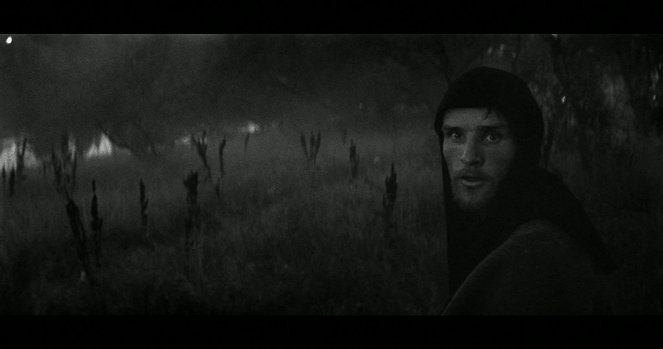Réalisation:
Andrei Arsenyevich TarkovskyPhotographie:
Vadim YusovMusique:
Vyacheslav OvchinnikovActeurs·trices:
Anatoly Solonitsyn, Nikolay Grinko, Bolot Bejšenalijev, Nikolay Burlyaev, Jurij Nikulin, Ролан Анатольевич Быков, Dmitri Orlovsky (plus)VOD (1)
Résumés(1)
Dans la Russie XVème siècle soumise à des princes cruels et ravagée par les incursions des Tatares, l'amour et la foi du moine Andrei Roublev sont mis à rude épreuve. Il a entrepris de peindre sur les murs des églises ses rêves d'un monde meilleur et se met en route vers la capitale où il est appelé pour décorer la cathédrale. Mais la barbarie, l'horreur, la misère auxquelles il se heurte au cours du voyage sont telles que Roublev décide de ne plus peindre et s'enferme dans le silence... Épique, sauvage, monumentale, cette fabuleuse histoire chargée d'amour et d'espérance est celle de l'un des plus grands peintres de tous les temps. Ce n'est que le deuxième long métrage de Tarkovski mais déjà, malgré les difficultés rencontrées avec les censeurs de son pays, il rencontre la consécration internationale. (Potemkine Films)
(plus)Critiques (5)
A breathtaking cinematic poem. Raw, stark, timeless. In some ways, its cinematic language reminds me of Vláčil's Markéta Lazarova. A classic of world cinema.
()
I am not a fan of similar stories (and I honestly don't like the mentioned Marketa Lazarova) and the only reason why I delved into several chapters of Eastern history was the reputation of Tarkovsky's masterpiece. That's why I welcomed the director's version, which exceeds half an hour in length, so that I could truly experience everything, and I still don't know if I made the right decision. I must admit that I mostly endured the first part. Life wisdom in the guise of a raw historical fresco is quite hard to swallow, and trying to grasp any passionate idea in every martyr's monologue just destroys me. What a surprise it was when the picture completely changed in the second part and the plot drew me in from the beginning, to the point where the Tatar raid became an unforgettable experience, for example. When I then enchantedly perceived the entire effort with the bell and its metaphorical resonance, I had the feeling that I had perhaps seen two different films stitched together under one title. However, the objections to the alienation and sometimes truly unbearable slowness remain, and considering that Solaris or the brilliant Stalker rely much more on imagination, I will still lean towards these later works.
()
Andrei Rublev is very important to Soviet, or rather Russian, cinema in that it is a monumental (and very expensive) medieval fresco. It was supposed to be a confident symbol of the post-war rise of Soviet film, representing the same thing for the era of Khrushchev's leadership as Ivan the Terrible did for Stalin and his gang. However, Tarkovsky guided the film toward religious symbolism and mysticism. After all, he originally named his work Andrei's Passion. The regime struggled for eight years to deal with the film, until it finally pardoned it. Tarkovsky dedicated a lot of energy to creating a sense of authenticity - he aimed for a raw, naturalistic style and used rough, unprocessed materials. It is undoubtedly a monumental work of national cinema, which would be difficult to create today. For me, it is Tarkovsky's most digestible film, but it is still true that the famous several-minute-long shots can tire out anyone. For me, the film represents a sympathetic and attractive version of the Middle Ages. The 205-minute director's cut proves that Tarkovsky did not take the viewer into consideration. Overall impression: 80%.
()
There are several simple reasons why I didn't like Andrei Rublev very much: 1) THE EMOTIONS: when in a 200 minute runtime there were only about 30 minutes that emotionally engaged me and made me sit firmly on my ass, I can’t be satisfied. 2) THE STORY: even though it’s extensive in time and narrative, rich in characters and period elements, formally it’s unbearably tedious, unnecessarily poetic and simply boring almost throughout. There are visible connections between the chapters and everything comes together to form a comprehensible whole, but Tarkovsky's interventions in the plot are often very insensitive, he only marginally introduces time jumps and the viewer often doesn't know what’s going on, or where and when. 3) THE MUSIC: while the uniquely bleak production design of the Czech film Markéta Lazarová relies heavily on a beautiful musical score, here this essential ingredient of all quality films is woefully absent (I regretted this especially in the final scene, where the enormous musical potential is revealed). What cannot be denied in terms of quality, however, is the polished, visually incredibly authentic and raw production design, which all great directors would have put behind them, and the historical verisimilitude in terms of the shape of secular life in the 15th century. But even that can't hide the sad fact that I endured most of the film rather resignedly and that I felt in completely different company than two weeks ago with the brilliant Stalker. 65%
()
Soviet film is simply not just communist propaganda, and Andrei Tarkovsky proves it more than many other creators. His films are very profound and you can find truly many things in them, in this case also a leaning towards God, or rather the question of the place of faith in human life. A strong film that surprisingly is not as magnificent as it might seem at first glance.
()

